Afro Samurai: Huge Namco Bandai Interview
Everything you need to know about this promising slasher in our interview with Namco's Daryle Tumacder and Kevin Chadaine, including cartoon violence censorship, Samuel L Jackson voice acting, and games enhancing source IP.
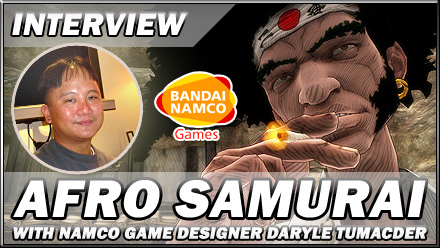
In the style stakes, Afro Samurai has absolutely nothing to prove. It has samurai, it has afros. This would probably have been enough in itself to make us frame the box art, but the game also has cell-shaded graphics - that vital prerequisite of the would-be art-house and/or cult classic - and while those graphics are easier to digest than the rather florid TV anime and mangas on which the game is based, they're otherwise entirely faithful to creator Takashi Okazaki's lank, ragged characters, outrageous action sequences and sizzling monochrome ambience. Then there's the hip hop soundtrack, studded with material from the RZA, Big Daddy Kane and other scary gangsta types, and to top it all off there's Samuel L. Jackson being Samuel L. Jackson - twice over, in fact, as the Pulp Fiction star has voiced both the titular Afro and Ninja Ninja, his loudmouthed sidekick.
What Afro Samurai has yet to prove, however, is that its stripped-back hack-and-slash ethos can still cut it, so to speak, in a world firmly in love with cover points, social networking services and living room karaoke. Like it or not, the business of running around introducing bulk-produced thugs to their own steaming innards just isn't as popular as it used to be. Having brushed up on our ninjitsu, Kikizo hunted down Daryle Tumacder, Game Designer with Namco Bandai Games America, and Kevin Chadaine, Assistant Production Coordinator with Namco Bandai Games Europe, to get an answer...
Kikizo: Afro Samurai is one of the more successful anime franchises in the west, but it hasn't exactly hit Naruto levels of ubiquity yet. Could you give our readers a quick introduction?
Daryle Tumacder: It's basically a story of revenge. There are two main headbands, the Number One and the Number Two. Whoever possesses the Number One headband has the powers of a god, so everyone's trying to attain that. The only person who can challenge the Number One to attain the headband is the Number Two headband. Unfortunately for the Number Two headband person, everyone can challenge that guy to become the Number Two, so they can get the Number One headband.
When Afro was growing up his father was the Number One. He got challenged by Justice, who was then Number Two. Justice defeated his father, and in doing so became the Number One and became a god. Afro just wants to avenge his father so early on in the series if you watch the anime or in the game, he's just trying to attain the Number Two so he can avenge his father's death. And that's really the whole story: him without the Number Two, attaining it, then with the Number Two pursuing and finding his nemesis.
There are many other headbands in the story as well as the main ones, but for this story it's just him trying to shortcut everything and get to the Number Two, so he can go for vengeance.
Kikizo: This was a Japanese franchise originally, right?
Tumacder: Yeah, it was originally a manga by Takashi Okazaki. It then became an anime series, and from there, the game.
Kikizo: So when did Samuel L. Jackson get involved?
Tumacder: He got involved early on when they were making the anime series on TV.
Kikizo: For the US adaptation?
Tumacder: Yes.
Kikizo: How specifically did Afro Samurai come to be a game, and how did it end up in the hands of Namco?
Tumacder: I'm not sure how it got pitched to us and who met who to make it happen. It's been talked about ever since the series was born, the anime series - they've always wanted to do a game for it, because it had such a mass appeal for the style of gamer that's emerging in America right now, the very violent kind of gamer [laughs], a manga-oriented kind of person. Through the years the appreciation for manga in America has grown hugely.
Kikizo: Namco Bandai also publishes the Naruto games. Have you shared any of their assets with Afro Samurai?
Tumacder: There are two different teams. When we're developing we're basically developing around the same time, so we showed off each others' stuff, but as far as stealing any tech - I don't think we shared any tech at that point.
Kikizo: So it's more about one-upmanship...
Tumacder: Yeah, yeah. [laughs]
Kikizo: Have you taken the soundtrack straight from the anime?
Tumacder: Some of it was from the anime, some of it was created just for the game. Our music supervisor... gave us one extra bonus track that we could use that was created specifically for this game.
Kikizo: Is this brand popular in Japan?
Tumacder: The mangas started there so there is that small niche of people that are aware of it there. But of course there's a huge fanbase in America because Samuel L. Jackson is in it... there's a huge appeal there. But I think as far as fans of the manga, I don't think it's as big as for fans of the TV show.
Kikizo: I'm a huge fan of really technical melee-focussed action games - Ninja Gaiden series, Devil May Cry, Bayonetta, to name a few. If you were to take away Afro Samurai's unique visual style, which other game from that genre would it be most similar to, if any?
Tumacder: It's similar to other games in the genre because it's swordplay and it's action. One thing we don't want to do with our game is market it to the hardcore gamer - we want it to be as open as possible for fans of anime, fans of hip hop... just fans of gaming. We do have very hardcore elements in here - very advanced techniques - as well as a larger [proportion] of easily accessible content... So we think we address each style of gamer.
We really want this to be open - I mean, it's such a beautiful experience to play the game, no HUD, it's beautiful. This is one of those games you could watch your friend play and be mad that you're not playing it, it just looks awesome. You've got the Sam Jackson voiceover, it's funny... I must have heard each of these lines a thousand times, you know, and there are still some lines that crack me up, because of the way he says them.

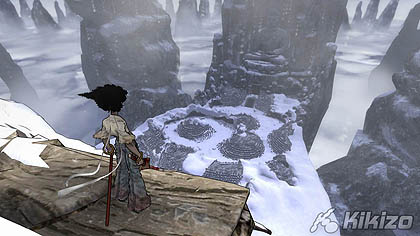
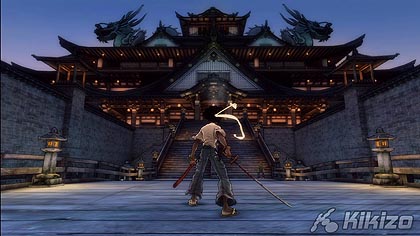
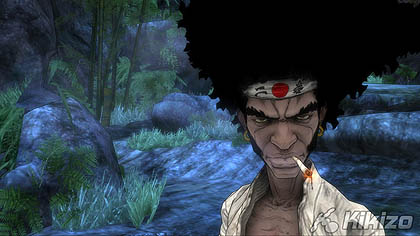
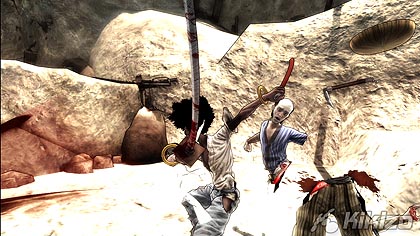




 Satoru Iwata Video Interview - the late Nintendo president spoke with Kikizo in 2004 as 'Nintendo Revolution' loomed.
Satoru Iwata Video Interview - the late Nintendo president spoke with Kikizo in 2004 as 'Nintendo Revolution' loomed. Kaz Hirai Video Interview - the first of Kikizo's interviews with the man who went on to become global head of Sony.
Kaz Hirai Video Interview - the first of Kikizo's interviews with the man who went on to become global head of Sony. Ed Fries Video Interview - one of Xbox's founders discusses an epic journey from Excel to Xbox.
Ed Fries Video Interview - one of Xbox's founders discusses an epic journey from Excel to Xbox. Yu Suzuki, the Kikizo Interview - we spend time with one of gaming's most revered creators.
Yu Suzuki, the Kikizo Interview - we spend time with one of gaming's most revered creators. Tetris - The Making of an Icon: Alexey Pajitnov and Henk Rogers reveal the fascinating story behind Tetris
Tetris - The Making of an Icon: Alexey Pajitnov and Henk Rogers reveal the fascinating story behind Tetris Rare founders, Chris and Tim Stamper - their only interview? Genuinely 'rare' sit down with founders of the legendary studio.
Rare founders, Chris and Tim Stamper - their only interview? Genuinely 'rare' sit down with founders of the legendary studio. The History of First-Person Shooters - a retrospective, from Maze War to Modern Warfare
The History of First-Person Shooters - a retrospective, from Maze War to Modern Warfare